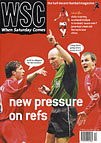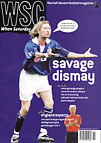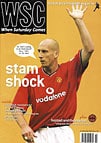 Dear WSC
Dear WSC
Whilst sleeping my way through the recent Varteks v Villa game, the aftermath of a rather nasty tackle by George Boateng reminded me fondly of the late Brian Moore. On seeing the verdict of the referee, Barry Davies announced with a resigned air that “the card is red” when, correct me please if I am wrong, it was quite obviously yellow. Either dear Barry is colour blind or he’s taking it upon himself to replicate the obvious inaccuracies that Brian was regularly capable of. Trouble is, I used to laugh at the old planetarium head, but just found myself shouting “That’s crap Barry, it’s yellow” at the screen in a really irritated manner. I suppose it livened up the worst game this millennium though.
Dave Wallace, via email
Search: ' Supporters Direct'
Stories
 Dear WSC
Dear WSC
I am writing in defence of “Super”Chrissy Sutton, who was bracketed along with Collymore and Anelka as a “take the money and run” football pirate by Patrick Brannigan in his musings on the Sol Campbell affair (Letters, WSC 176). Maybe I’m missing something, but as far as I am aware Sutton has played for only four clubs in a ten-year plus career – which seems about an average ratio, I would suggest. At none of them did he make outrageous wage demands, nor has he ever refused to play – in any position, as Norwich fans will remember. Why is he equated with Anelka or Collymore? What’s the problem here? “Super” Chrissy, as us country folk in Norfolk remember him, seems to attract much opprobrium among general football folk, which confuses me. Yet, apart from a dodgy season with Chelsea, he has invariably played well and always with all his heart. Two championship medals and a bag of goals either side of the border would suggest he’s worth the cash. But then, I’m just a simple country lad who knows nowt but tractors.
Jez Booker, via email
 Burnley have nurtured a community-conscious image, but their response to this summer's riots confirmed the club's blind spot over racism, says Andrew Firmin
Burnley have nurtured a community-conscious image, but their response to this summer's riots confirmed the club's blind spot over racism, says Andrew Firmin
The last few years have been strange ones for Burnley. We no longer fight relegation to the Third Division, but instead hold plausible hopes of a top six finish in the First. A new regime runs the club, season ticket sales are through the roof and our manager has put together a team that wins a lot. Supporters are, therefore, mostly happy. They also have an opportunity to feel more involved. Representatives from Burnley’s diffuse network of supporters’ clubs are treated to regular meetings with the chairman and chief executive. Compare to the infamous days when one director asked: “What can a fan tell us that we don’t know?”
 Dear WSC
Dear WSC
Martin Cloake and Paul Kelso’s contributions to the Sol Campbell debate (WSC 175) highlight the head versus heart struggle most Tottenham fans have had to go through. I’m sure that every one of the 30,000 of us who gave him a standing ovation both on and off of the pitch at Old Trafford in the Cup semi-final were left feeling like mugs when we heard that he had finally signed for Arsenal. But to characterise Sol as a symbol of player disloyalty is ridiculous when there are a thousand other candidates who have made taking the money and running an art form: Collymore, Sutton, Anelka etc, etc, etc. The man was at the club for ten years and gave his all in every game he played. To expect more than that, or even half of that, is self-delusion on the part of fans. Fans are loyal, players aren’t. They can’t allow themselves to be. A change of manager, an injury, a loss of form can all see a player thrown out of a club in no time at all. No, what Sol was symbolic of – for Spurs fans anyway – was the idea that Spurs could recruit and keep top international players in their prime and not just those on their way up or down. This idea has taken a major knock now. On top of that, by going to Arsenal he is a symbol of how much they are in the ascendancy – as if we needed any reminding! – and how the board has mismanaged the club over the last ten years. Having said all that, if we’re honest, those of us who have watched Sol week in, week out since 1993 know that he’s not as good as the press would have everyone believe; his poor passing and lack of confidence going beyond the half-way line have been there for anyone to see. Would he get into the Italian national side? Perhaps he’s also a symbol of something else: the way players are hyped beyond recognition by the TV companies and press.
Patrick Brannigan, via email
 Where does the future of football on the internet lie? Bob Roberts believes big clubs hold the whip hand, while general, free-access sites are in trouble
Where does the future of football on the internet lie? Bob Roberts believes big clubs hold the whip hand, while general, free-access sites are in trouble
On Tuesday May 14, 2001, Celtic made internet football history by transmitting Tommy Boyd’s testimonial game against Manchester United as the first ever live broadband broadcast. The broadcast on their official website was the first “free-to-air” football match available on the internet, with picture quality allegedly comparable to television.